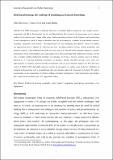| dc.contributor.author | Morrissey, John | |
| dc.contributor.author | Clavin, Alma | |
| dc.contributor.author | Reilly, Kathy | |
| dc.date.accessioned | 2017-10-04T13:02:31Z | |
| dc.date.available | 2017-10-04T13:02:31Z | |
| dc.date.issued | 2013-05-14 | |
| dc.identifier.citation | Morrissey, John, Clavin, Alma, & Reilly, Kathy. (2013). Field-based learning: the challenge of practising participatory knowledge. Journal of Geography in Higher Education, 37(4), 619-627. doi: 10.1080/03098265.2013.794333 | en_IE |
| dc.identifier.issn | 1466-1845 | |
| dc.identifier.uri | http://hdl.handle.net/10379/6853 | |
| dc.description.abstract | In 2009, Geography at National University of Ireland, Galway, launched a new taught master's programme, the MA in Environment, Society and Development. The vision for the programme was to engage students in the analysis and critique of the array of interventionary practices of development and securitization in our contemporary world. A range of modules were set up focusing on a number of interrelated concerns, including “geopolitics and security”, “environment and risk” and “managing development”. These core themes are approached from a number of critical perspectives, including political ecology, critical geopolitics and political economy. A key additional aim from the outset was to go beyond solely academic critique to consider participatory forms of development knowledge and practice that can emerge from “field-based learning”. To this end, a module entitled “field-based learning” was initiated, involving a 12-week seminar course in Galway, followed by a week-long fieldwork programme in Sarajevo, Bosnia and Herzegovina, where each year approximately 15 students intersect with the development work of local community leaders, the UN, EU and a variety of NGOs, civil society organizations and public advocacy groups. In this paper, we outline some of the key challenges of initiating and practising such a grounded and often unsystematic approach to learning in the field. We reflect, in particular, on the complexities involved in seeking to facilitate and practise critical participatory knowledges that comprise both academic and civic engagement values. | en_IE |
| dc.format | application/pdf | en_IE |
| dc.language.iso | en | en_IE |
| dc.publisher | Taylor & Francis | en_IE |
| dc.relation.ispartof | Journal of Geography in Higher Education | en |
| dc.rights | Attribution-NonCommercial-NoDerivs 3.0 Ireland | |
| dc.rights.uri | https://creativecommons.org/licenses/by-nc-nd/3.0/ie/ | |
| dc.subject | Field-based learning (FBL) | en_IE |
| dc.subject | Geography | en_IE |
| dc.subject | Taught masters | en_IE |
| dc.subject | Participatory knowledge | en_IE |
| dc.subject | Civic engagement | en_IE |
| dc.subject | Students | en_IE |
| dc.subject | Courses | en_IE |
| dc.subject | Experience | en_IE |
| dc.subject | Bosnia-Herzegovina | en_IE |
| dc.title | Field-based learning: the challenge of practising participatory knowledge | en_IE |
| dc.type | Article | en_IE |
| dc.date.updated | 2017-10-03T09:56:28Z | |
| dc.identifier.doi | 10.1080/03098265.2013.794333 | |
| dc.local.publishedsource | http://dx.doi.org/10.1080/03098265.2013.794333 | en_IE |
| dc.description.peer-reviewed | peer-reviewed | |
| dc.contributor.funder | |~|1267880|~| | |
| dc.internal.rssid | 5733756 | |
| dc.local.contact | John Morrissey, Room 111 Geography, National University Of Ireland, , University Road, Galway. 2267 Email: john.morrissey@nuigalway.ie | |
| dc.local.copyrightchecked | No | |
| dc.local.version | ACCEPTED | |
| nui.item.downloads | 343 | |


